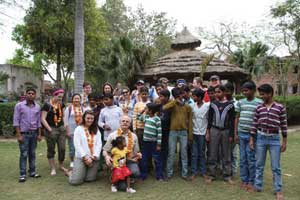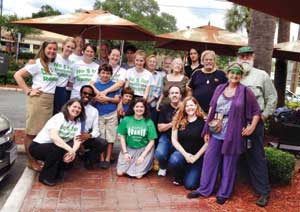Friends school service trip to India

A group of ten students and two faculty members from Delaware Valley Friends School (DVFS) in Paoli, Pa., traveled to India on April 11–19, 2014, during the school’s spring break, as part of their participation in DVFS’s educational and service-oriented ABLE (Adventure Based Learning Experience) program. Prior to going on the trip, the ABLE India team raised funds to support Access to Education, a nonprofit that purchases bicycles for children (mostly girls) in rural areas of Rajasthan and Bihar who are classified as Untouchables in their culture. The bicycles, which are built in India and designed to withstand the forest terrain, make it possible for the children to attend school, often located more than 10 miles from their homes. Each bicycle comes with a repair kit. The organization was founded in 2008 by DVFS senior Thomas Hircock. Hircock and his father, David, assisted the ABLE coordinator in the logistics of April’s service trip to India. David Hircock accompanied the group as a liaison on the 8-day adventure.
During their time in India, the ABLE team visited five different cities. In Delhi, the National Capital Territory of India, they spent time at Mukti Ashram, a short-term rehabilitation center for children rescued from child labor and trafficking that is run by the Save the Childhood Movement, known locally by the Hindi name Bachpan Bachao Andolan (BBA). In Varanasi, a city on the banks of the Ganges in Uttar Pradesh, the group stayed for two days visiting Bal Ashram, a rehabilitation and training center for abandoned and orphaned children, with a focus on providing quality education, vocational training, skill development, and a safe place to live. While at Bal Ashram, they helped to distribute 15 bicycles, purchased by Access to Education, to 14 girls and 1 boy from villages in Rajasthan and Haryana.
The significance of these bicycles, and the impact they will have on the girls, was expressed by DVFS junior Rebecca Costello, who remarked, “We cry if our iPhone breaks, yet look at what these children have been through! They haven’t forgotten what has happened to them, but they don’t let it weigh them down, either. They’re paving the path for the rest of their lives—they want to go back to their communities and advocate. It’s so inspiring to see that they want to help other children so it doesn’t happen to them.”
Other cities the group visited include Viratnagar, where they saw Beejak ki Pahari, the remains of a 2,000-year-old Buddhist monastery, and a Jain temple; Alwar, where they spent an afternoon at Sariska Tiger Reserve; and Agra, where they got to see the great Taj Mahal. The last day of the trip was back in Delhi, where the group met with staff of BBA in their main offices. They heard from Bhuwan Ribhu, the national secretary of BBA, who spoke of the challenges of working against child labor and slavery—the largest criminal activity in the world in terms of money, according to Ribhu.
Read all of the trip updates from the DVFS ABLE India team at fdsj.nl/DVFS-India.
Quakers continue fight for PNC divestment

Every year, PNC Bank has their annual shareholder meeting in either Pittsburgh, Pa., or Washington, D.C. This year though, Earth Quaker Action Team (EQAT) had PNC on the run. PNC was determined to discourage EQAT’s attendance after the group’s nonviolent direct action at last year’s shareholder meeting (they held meeting for worship in the middle of the session) caused PNC to shut down the hour-long assembly in 17 minutes. EQAT has been protesting the bank’s financing of mountaintop removal coal mining, a destructive practice that causes cancer and birth defects in Appalachia.
A long list of rules was issued by PNC for this year’s meeting, including no cell phones, but more of a surprise was that the shareholder meeting was to be convened in Tampa, Fla. PNC’s location strategy became clear: Florida is a state with strict laws around protests and free speech; it’s a far trip from Philadelphia, Pa., where many of EQAT’s members reside; and the Appalachian mountains do not run through Florida—a fact PNC may have hoped would mean the state’s residents would have little to no stake in protecting the Appalachian region.
But on April 22, Earth Day, a group of 26 people gathered outside of the hotel where the shareholder meeting was being held, opposing PNC’s mountaintop removal investments and standing in solidarity for Appalachia. Of the 26 people present, 22 were from Florida. Other groups represented included Southeastern Yearly Meeting (SEYM), Gainsville Loves Mountains, and Everglades Earth First. The young Friends of SEYM were on the ground before EQAT, recruiting Friends at their yearly meeting gathering, painting beautiful signs, and taking off school to come to the protest.
Nine of the protesting individuals attempted to go into the hotel, ready to act in prayerful protest in the meeting. All but EQAT member Eileen Flanagan were halted at the door, informed that they could not enter due to a technicality that PNC had never before enforced. The meeting itself was rushed through in under 15 minutes.
Despite being denied access to the shareholder meeting, EQAT still sent a clear message. The day before, EQAT member Carolyn McCoy delivered the following message in a press conference in Pittsburgh: if PNC does not pass a full sector exclusion (essentially divesting in mountaintop removal) by June 1, 2014, then EQAT will come to the doorsteps of PNC headquarters in July with Quakers and friends from all around the country to speak out against the devastation of communities in Appalachia. This year, the Friends General Conference Gathering will be held in California, Pa., right outside of Pittsburgh. EQAT is working to gather Quakers from all four corners of the country to participate in the protest.
Learn more at eqat.org.
Quaker lobbying for peace
At the end of May, the U.S. House of Representatives considered legislation that would put an end to the 2001 Authorization for Use of Military Force (AUMF). The final vote was 191 to 233, with 218 votes needed for the repeal to pass.
The AUMF was passed immediately after the attacks of September 11, 2001, and has given two presidents nearly limitless authority to wage war. It has also served as the legal foundation for the indefinite detentions at Guantanamo Bay, global drone strikes, and mass surveillance.
Friends Committee on National Legislation (FCNL) has led efforts to repeal the AUMF. For the past few months, the organization has conducted nearly 80 direct lobbying visits, hosted a Spring Lobby Weekend for nearly 200 young people to lobby their representatives, initiated communications to legislative offices, and organized in-person, district visits for constituents to meet with their legislators. On the day of the vote, FCNL also sent a letter to the House of Representatives asking that the AUMF be repealed; the letter was signed by many other faith and advocacy organizations including American Friends Service Committee, Church of the Brethren, CREDO, Mennonite Central Committee (U.S. Washington Office), Peace Action, and United for Peace and Justice.
When the House voted this year, there were 21 new votes in favor of repeal since the last time it was voted on last year. Altogether, 208 current members of the House have voted in favor of repealing the AUMF between last year’s vote and this one.
The possibility of AUMF repeal in the House of Representatives is now very real, and the momentum is beginning to spread to the Senate. Repeal could mean the end of the war on terror, the acceleration of the closing of Guantanamo, and meaningful checks on executive war authority. This is, at its heart, a fundamental peace issue, and Quaker lobbying has made peace possible.
Learn more about FCNL’s efforts to repeal the AUMF at fcnl.org.



Comments on Friendsjournal.org may be used in the Forum of the print magazine and may be edited for length and clarity.